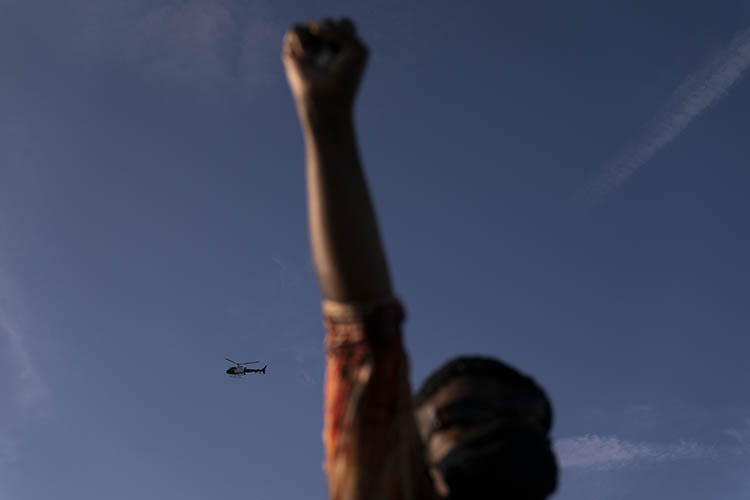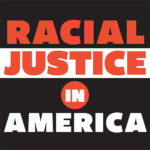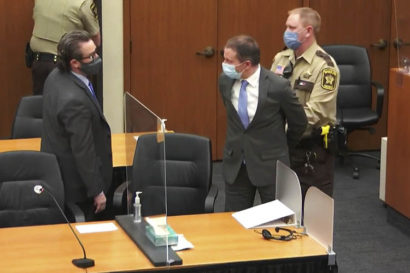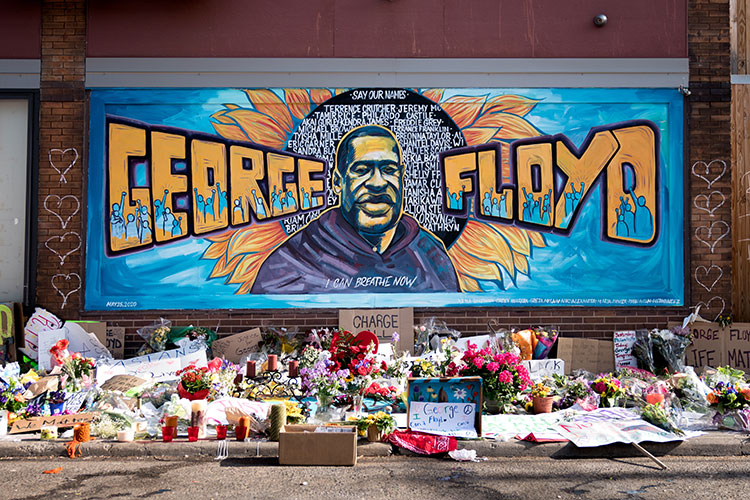One year after George Floyd: When will white Americans rise up for justice?
"I’m always and forever optimistic about Blackness," says Berkeley Law scholar
May 25, 2021

A Los Angeles Police helicopter hovers as Joyce Robertson, foreground, clenches her fist in Los Angeles after a guilty verdict was announced at the trial of former Minneapolis police Officer Derek Chauvin for the 2020 death of George Floyd. (AP photo by Jae C. Hong)
In the long and terrible history of violence against Black people in America, the police killing of George Floyd one year ago may someday stand as a historical marker: After all that the nation has been through, we may have imagined that we had made indelible progress, but the way that Minneapolis Police Officer Derek Chauvin planted his knee in Floyd’s neck was a blunt counterpoint.
Following this instance of “grotesque and banal racialized violence,” UC Berkeley author and social justice scholar Savala Nolan was surprised by the upwelling of anger and revulsion among so many Americans across lines of race, class and culture. Tens of millions of people protested, the vast majority of them peacefully, and the outrage reached from the street outside of Cup Foods in Minneapolis, where Floyd was killed, to corporate boardrooms and the highest ranks of the U.S. military and government.

Over the last several months, Berkeley News has examined racial justice in America in a series of stories.
But for the death of George Floyd to have the power to advance racial justice, Nolan said, it falls to white people to understand what happened that day, and why it happened. White families and white communities will have to think more deeply and have difficult discussions about their own roles in racial oppression.
“We’ve yet to have a sustained, determined, critical mass of white people demand and fight for an end to racial hierarchy, whatever that may cost them,” Nolan said. “We just haven’t seen that.”
Savala Nolan is the executive director of the Thelton E. Henderson Center for Social Justice at the UC Berkeley School of Law. Her writing has been featured on NPR and in Vogue, Time, Forbes, Huffington Post and Health, among others. Her first book — Don’t Let It Get You Down: Essays on Race, Gender, and the Body — will be released by Simon & Schuster in July.
This interview has been edited for length and clarity.
Berkeley News: Do you recall your initial reaction to the police killing of George Floyd?
Savala Nolan: I don’t. And my lack of recall isn’t incidental. These killings are so common, in our own lifetime and historically, that unless you’re at the epicenter of the event, they can blur together. It’s tough for me to distinguish the memory and emotion of learning about George Floyd’s murder from learning about what happened to Breonna Taylor, or Ma’Khia Bryant, or Daunte Wright, and so on.
What I can tell you is that the common denominator is pain. I’m wary of saying that, because I wonder sometimes whether our culture is just a little too comfortable with Black pain, a little too acclimated. I don’t want to add to that familiar pile we all seem to pass and glance at, nodding our heads knowingly, before we move on with our day. But it’s also just a fact.
What binds these killings together for me is a dark, physical sense of grief. Of being crushed. Of anger. Of an open wound being brutally reinjured.
I can also tell you that I cannot and will not watch the video of Floyd’s death. I have seen split seconds of it when I couldn’t avoid it, but I wince. Reflexively, I turn away. Some people felt they needed to watch it to bear witness, to integrate it into themselves, and if it’s a Black person making that call, okay.
But I don’t want to take it into myself, and I squirm away from the idea of seeing such a profoundly intimate moment in Floyd’s life — the moment his life was taken from him — while knowing so little else about him. That’s as true now as it was a year ago.
When you consider the national reaction to the murder, is there anything that particularly strikes you or surprises you?
It surprised me that the reaction, especially among non-Black people, was so swift and strong — not because it didn’t deserve a swift and strong reaction, but because there is nothing new about slow, public Black death at the hands of state power or quasi-state power.
So why now? A lynching takes time; being beaten by cops takes time; bleeding out after being shot takes time. Several minutes at least. Have we forgotten this? Had we begun to think of death — Black death — as something so quick it was unstoppable? And did that false notion make the length of this event — the number of moments during which Floyd’s death could have been stopped — hit us differently? Had we forgotten that witnessing black death has often been integral to the enterprise of white supremacy? That both Black and white people have been meant to see Black death and draw lessons from it?
Consider a lynching. Consider the popular postcards made of photographs of lynchings, which extended both the duration and public scope of the event as they were mailed around the country. I don’t have the answers to these questions. But I’m pondering them.
Why, when the killing of George Floyd shares so much with other wrongful Black deaths, did it spark the conscience of so many non-Black people?
What do you think that we, as a society, have learned from the police killing of George Floyd?
It’s way too soon to tell. As a culture, we like to get to the ‘lesson learned’ part as quickly as possible, without necessarily doing the deep wrestling with the lesson itself. We want to do the flash-card style learning when this is really like an old-school math problem — show me your work. Especially with race — recall how quick some were to declare us ‘post-racial’ after Barack Obama was elected. So I get the question, but I believe it’s way too soon to say what we’ve learned. Collectively, we are still processing.
But let me not totally refrain from answering. As a Black woman, what have I learned? Not much.
I already knew these events happened regularly. I already knew they could be extraordinarily grotesque — nine minutes. And banal — the casualness of Officer Chauvin’s expression and body language. Perhaps there was more to be learned for the average white person — more of a bracing, slap-across-the-cheek moment, in which the reality of how regular, grotesque and banal racialized violence can be suddenly crystallized.
And people who are neither white nor Black can fall into either camp — meaning, they can have more of a Black political consciousness and not have been surprised, or more of a white political consciousness and have been caught off guard.
Let me add that not being surprised is different than not being moved. Of course, Black people, and others, were moved to tears, despair, protest and so on by Floyd’s tragic and preventable death. The regularity of these events does not diminish our grief. It intensifies it.

Chauvin was handcuffed and take to prison after being found guilty in the murder of George Floyd. (Court TV photo via AP)
A few weeks ago, a jury found Derek Chauvin guilty of murder and manslaughter. Among many people, it seemed, there was a sense: ‘Justice has been done, at last.’ But what’s your view? How should we understand the verdict?
I view the verdict as a significant but very small moment of accountability. I don’t view it as justice. Justice is fair treatment. Justice was off the table the moment Floyd was killed, or somewhere in the nine minutes before then. Justice would mean Floyd going to work today, seeing spring flowers, breaking bread with his loved ones. Justice isn’t possible now that he’s dead.
I think people may have been overjoyed and relieved after the verdict — as I was — simply because accountability is so rare. Black people, and those of us who aren’t Black but who have a progressive political consciousness, are used to perpetrators facing no consequences, or only the mildest of consequences, for violating our civil and human rights.
In those few moments when we knew the jury had reached a verdict but did not know what it was, I sat on my couch with my entire body clenched, texting furiously with all the people I know who were also tense and clenched, some Black and some not, because we understand that no matter how clear and compelling the evidence, we cannot count on accountability.
Right around the time Chauvin was being tried and then found guilty, there was a surge of incidents in which other white officers shot or killed other Black people. And I can’t help but wonder: Did the guilty verdict really resolve anything? After decades, after centuries, is it possible that we are instead going deeper into this crisis of racial antagonism and violence against Black people and other people of color?
The verdict can’t resolve anything except the extent to which a single officer will be held legally accountable for his choices. The urge to think the verdict will ‘resolve’ the racial hierarchy in our country, or its violent manifestations, is a little like the giddy declaration that we were suddenly ‘post-racial’ after Obama was inaugurated — it’s trying to get to ‘lessons learned’ way too quickly.
Whether we’re barreling deeper into a crisis of racial antagonism and violence is a good question, and the answer is really up to white people. White people are more proximate to power in our culture, and white folks are the ones whose committed efforts and long-haul protest have historically been missing. I’m not talking about individual white people, per se. I’m talking about a critical mass of white people.
We’ve yet to have a sustained, determined, critical mass of white people demand and fight for an end to racial hierarchy, whatever that may cost them. We just haven’t seen that. Black and brown people have been fighting to end racial hierarchy, at great cost, including their lives, for centuries. We’ve been here already! We’re up to our knees and elbows in this mud — others are just getting their fingernails dirty.
So whether we turn toward liberation and equity or toward violence and degradation is, in large part, up to what white people want. This doesn’t mean the efforts of BIPOC aren’t useful or necessary — they are. But you can’t cross a river if everyone in the boat is paddling in different directions. And if some of those people have bigger paddles — more power, or proximity to power — the direction of their strokes is critically important.

A mural honors George Floyd, near the site of his death in Minneapolis, Minn. (Photo by Lorie Shaull via Flickr)
When you consider all of the people who sided against Black Lives Matter after Ferguson, and again after Minneapolis, when you consider the pro-police Blue Lives Matter movement that has sprung up as a reaction to the BLM protests — what is needed to have a constructive discussion that really addresses our deep racial tensions?
I reject a bit of the premise here. ‘Our’ deep racial tensions are primarily tensions white people have, within themselves and among themselves, about whether and how to deal with the catastrophically unfair system of hierarchy they’ve inherited, internalized and live on top of. Those tensions get directed at people of color, but they don’t necessarily belong to us.
The constructive discussion that most needs to happen is among white people. Many of the white folks who doubled down on their anti-black views after Ferguson, etc., did so because they didn’t get the intervention and education they needed from other, more clear-eyed white folks in their lives. We really need to understand that. Would-be white allies really need to understand that.
Because 75% of white people don’t have any Black friends, and the rest are likely to have only one! The work — the constructive discussion — has to be white-to-white before it can be interracial, or at the very least it must happen concurrently. Yes, we need discussion across racial groups — but only when the white people entering the discussion are doing the internal and public work of assessing and addressing their own relationship to white supremacy. How it shows up in their preferences, their choices, their spaces and so on.
The same is true, though to a much lesser extent, about anti-Black racism among non-Black people of color, by the way. But the heavy lifting lies with white folks. We literally cannot arrive at productive interracial conversations if white allies ignore or put off hard conversations with other white people. Think of it as a numbers game — there just aren’t enough Black people, let alone Black people who are friends with white people, to do it on our own.
So if you’re white, and aim to be an ally, ask yourself: Am I talking to the other white people I know about racial equity? Am I engaging my spouse? Am I bringing it up with my parents? My friends? If the answer is no, or not really, then what’s going on there? Maybe something is at stake for you if you insist on these conversations. Maybe apathy is very, very comfortable. But get to the bottom of what’s anchoring your silence. That’s a prerequisite to progress.
Are you optimistic that we can have this discussion, that we can bridge this divide?
I’m optimistic that, to borrow from artist Alisha B. Wormsley, there are Black people in the future. That we will continue. That they can’t kill us all. That we’ll continue to be born, to love, to parent, to expand as a people for centuries to come. That we’ll continue to create and recreate art and music and community and style and philosophy and literature and joy.
I’m always and forever optimistic about Blackness.
